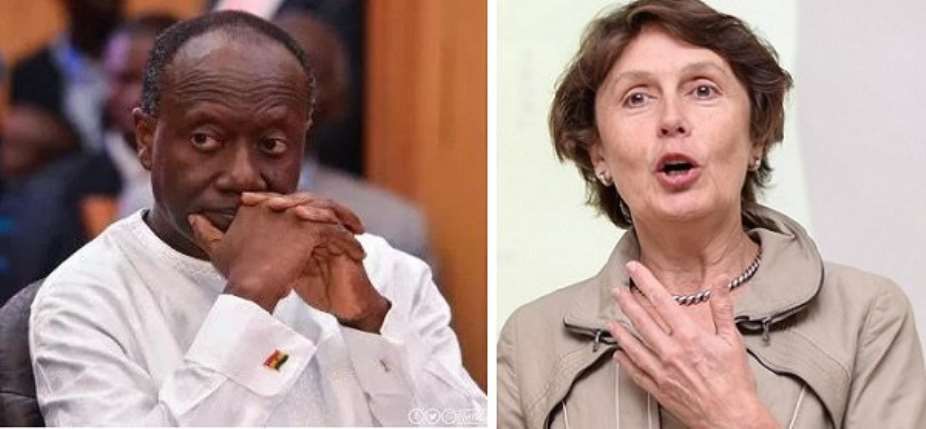The Akufo-Addo government has left the International Monetary Fund confused about whether a $2bn China deal constitutes a loan.
The classification is important because Ghana's debt stock of at least 120bn cedis will shoot up if the China deal is classified as a loan. It would also raise questions about Ghana's debt sustainability.
The government has insisted the deal, in which China will provide $2bn worth of infrastructure in exchange for equal worth of bauxite, is barter, not a loan.
The Minority has insisted this is a loan.
"Let nobody attempt, through deception, to say that this is not a loan," Minority leader Haruna Iddrisu said during the Parliamentary approval of the Master Project Support Agreement (MPSA) covering the agreement.
Dissatisfied with government's explanation, the Minority petitioned Ghana's economic policy supervisor, the IMF and asked for clarification.
The IMF Country Representative Natalia A. Koliadina has replied the petition from Haruna Iddrisu and Minority spokesperson for Finance Ato Forson.
"Given the complexity of the transaction, I am unable to answer your questions immediately", the response dated August 30, 2018, reads.
The IMF Resident Director said the Fund will be discussing the financial agreement at its next meeting where Ghana's IMF deal will also be reviewed.
The confusion arises from a difficulty in determining whether the agreement falls under the IMF's definition of loan. The technical memorandum of understanding the IMF has with Ghana confines government to how much it can borrow.
The IMF on its website, says the term “debt” will be understood to mean a current, i.e., not contingent, liability, created under a contractual arrangement through the provision of value in the form of financial and nonfinancial assets (including currency) or services, and which requires the obligor to make one or more payments in the form of assets (including currency) or services, at some future point(s) in time; these payments will discharge the principal and/or interest liabilities incurred under the contract. Debts can take a number of forms, the primary ones being as follows:
"(i) loans, i.e., advances of money to the obligor by the lender made on the basis of an undertaking that the obligor will repay the funds in the future (including deposits, bonds, debentures, commercial loans and buyers’ credits) and temporary exchanges of assets that are equivalent to fully collateralized loans under which the obligor is required to repay the funds, and usually pay interest, by repurchasing the collateral from the buyer in the future (such as repurchase agreements and official swap arrangements)."
The IMF is under pressure in the US to reign in African countries from the influence of China which has been splashing out badly needed cash on African countries in exchange for mineral resources.

The Chinese president, Xi Jinping, announced China will spend as much as $60bn (£46.8bn) in investment, aid and loans in Africa over the next three years.
An article on US media outlet CNBC noted that "by pouring money into Africa, China has seen an opportunity to both gain political influence and to reap future rewards in a continent whose economies are predicted to boom in the coming decades".
In the case of Ghana, China's Sinohydro Corporation Limited would pre-finance the construction of roads, hospitals, interchanges, the works - all at the cost of $2bn.
Government has a repayment period of 12 years, with three years grace period.
Only the payment is in raw, core bauxite ore at an interest rate of between 2.8 per cent and less than 3.3 per cent per annum on the London Interbank Offered Rate (LIBOR).
President Nana Akufo-Addo is in China to finalise the agreement.





 Whoever participated in the plunder of the state must be held accountable – Jane...
Whoever participated in the plunder of the state must be held accountable – Jane...
 A vote for John and Jane is a vote to pull Ghana from the precipice of destructi...
A vote for John and Jane is a vote to pull Ghana from the precipice of destructi...
 I’ll repay your abiding confidence with loyalty, understanding and a devotion to...
I’ll repay your abiding confidence with loyalty, understanding and a devotion to...
 ‘I’ve learnt deeply useful lessons for the future' — Serwaa Amihere breaks silen...
‘I’ve learnt deeply useful lessons for the future' — Serwaa Amihere breaks silen...
 I’m sorry for the embarrassment – Serwaa Amihere apologises for leaked sex video
I’m sorry for the embarrassment – Serwaa Amihere apologises for leaked sex video
 Dumsor: Matthew Opoku Prempeh not in charge of Energy sector – Minority
Dumsor: Matthew Opoku Prempeh not in charge of Energy sector – Minority
 Adu Boahen’s murder: Police arrest house help who was in possession of deceased’...
Adu Boahen’s murder: Police arrest house help who was in possession of deceased’...
 Akufo-Addo nominates Felicia Attipoe as Tema West MCE
Akufo-Addo nominates Felicia Attipoe as Tema West MCE
 Election 2024: I can't have someone I defeated twice as my successor – Akufo-Add...
Election 2024: I can't have someone I defeated twice as my successor – Akufo-Add...
